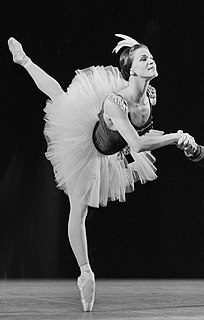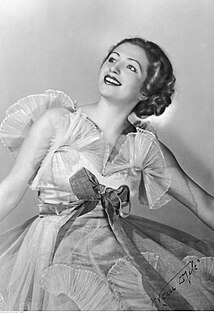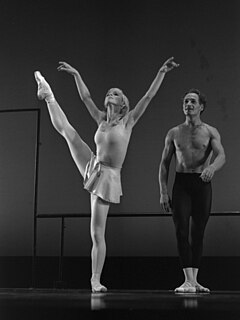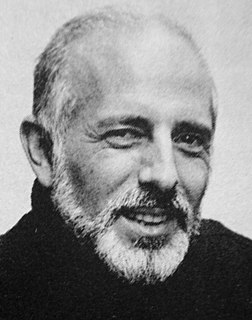 W
WPaula Julie Abdul is an American singer, songwriter, dancer, choreographer, actress, and television personality. She began her career as a cheerleader for the Los Angeles Lakers at the age of 18 and later became the head choreographer for the Laker Girls, where she was discovered by The Jacksons. After choreographing music videos for Janet Jackson, Abdul became a choreographer at the height of the music video era and soon thereafter she was signed to Virgin Records. Her debut studio album Forever Your Girl (1988) became one of the most successful debut albums at that time, selling 7 million copies in the United States and setting a record for the most number-one singles from a debut album on the Billboard Hot 100 chart: "Straight Up", "Forever Your Girl", "Cold Hearted", and "Opposites Attract". Her six number one singles on the Billboard Hot 100 tie her with Diana Ross for seventh among the female solo performers who have topped the chart.
 W
WMichaela Mabinty DePrince is a Sierra Leonean-American ballet dancer. With her adoptive mother, Elaine DePrince, Michaela authored the book Taking Flight: From War Orphan to Star Ballerina. She rose to fame after starring in the documentary First Position in 2011, following her and other young ballet dancers as they prepared to compete at the Youth America Grand Prix. She formerly danced with the Dance Theatre of Harlem as the youngest dancer in the history of the company and currently dances as a soloist for the Dutch National Ballet. Since 2016 Michaela is a goodwill ambassador with the Dutch organisation War Child, based in Amsterdam.
 W
WSonia Gaskell was a Lithuanian-Dutch-Jewish dancer, choreographer, dance teacher, and dance director.
 W
WMelissa Hayden was a Canadian ballerina at the New York City Ballet.
 W
WBella Lewitzky was a modern dance choreographer, dancer and teacher.
 W
WFranciszka Manheimer-Rosenberg, better known as Franceska Mann, was a Polish Jewish ballerina who according to some accounts had killed a Nazi guard while a prisoner at the Auschwitz concentration camp, Josef Schillinger, and wounded at least one other, Wilhelm Emmerich, initiating an uprising among female Jewish prisoners before she was killed, presumably by gunfire. In the most popular version of the event, but never verified, Mann is said to have performed a striptease for members of the Nazi regime and once down to naught but high heels, took one of her shoes and stabbed Walter Quakernack in the face with the heel-piece, causing him to drop his firearm, which she then used to shoot Schillinger and Emmerich. Schillinger ultimately died from his wounds several hours later while Emmerich was left with a permanent limp. According to another account, however, she was a Nazi collaborator who was executed by the Polish underground in the Fall of 1942.
 W
WDame Alicia Markova DBE was a British ballerina and a choreographer, director and teacher of classical ballet. Most noted for her career with Sergei Diaghilev's Ballets Russes and touring internationally, she was widely considered to be one of the greatest classical ballet dancers of the twentieth century. She was the first British dancer to become the principal dancer of a ballet company and, with Dame Margot Fonteyn, is one of only two English dancers to be recognised as a prima ballerina assoluta. Markova was a founder dancer of the Rambert Dance Company, The Royal Ballet and American Ballet Theatre, and was co-founder and director of the English National Ballet.
 W
WSulamith Mikhailovna Messerer, OBE was a Russian ballerina and choreographer who laid the foundations for the classical ballet in Japan.
 W
WOhad Naharin is an Israeli contemporary dancer and choreographer. He served as artistic director of Batsheva Dance Company from 1990; he stepped down in 2018.
 W
WValery Matveevich Panov is an Israeli dancer and choreographer. Born and raised in the Soviet Union, he trained in Leningrad and performed with the Kirov from 1964 to 1972. He and his second wife Galina, who was a ballerina at the Kirov, came to international attention in 1972 when they applied for exit visas to emigrate to Israel, which they were given in 1974. Panov worked with the Berlin Opera Ballet, as well as companies in other western European and North American countries, during the late 1970s and 1980s. He formed the Ashdod Art Centre in Israel, in 1993, and five years later founded the Panov Ballet Theatre, also in Ashdod.
 W
WJerome Robbins was an American choreographer, director, dancer, and theater producer who worked in classical ballet, on stage, film, and television. Among his numerous stage productions were On the Town, Peter Pan, High Button Shoes, The King and I, The Pajama Game, Bells Are Ringing, West Side Story, Gypsy, and Fiddler on the Roof. Robbins was a five-time Tony Award-winner and a recipient of the Kennedy Center Honors. He received two Academy Awards, including the 1961 Academy Award for Best Director with Robert Wise for West Side Story.
 W
WIda Lvovna Rubinstein was a Russian dancer, actress, art patron and Belle Époque figure. She performed with Diaghilev's Ballets Russes from 1909 to 1911 and then quit to form her own company. Boléro by Ravel (1928) was among her commissions.
 W
WAnna Sokolow was an American dancer and choreographer who worked internationally, creating political and theatrical pieces. She worked with major companies, including the Martha Graham Company and Batsheva Dance Company. Sokolow also formed her own group “Dance Unit” which became Players’ Project after its dispersal and her death.
 W
WHadassah Spira Epstein, professional name Hadassah, was a Jerusalem-born American dancer, choreographer, and instructor specializing in Indian, Javanese, Balinese, and Jewish dance. Credited as a pioneer of Indian and Israeli dance in the United States, her choreography reflected both aspects and styles of ethnic and folk culture and her own deeply-held spiritual beliefs. Her signature dance, "Shuvi Nafshi" (1947) was based on a verse in Psalm 116.
 W
WNancy Laura Spungen was the American girlfriend of Sid Vicious, bassist for the English punk rock band the Sex Pistols, and a figure of the 1970s punk rock scene. Spungen's life and death have been the subject of controversy among music historians and fans of the Sex Pistols.